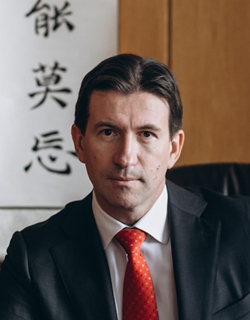
Illustration: Liu Xidan/GT
Editor's Note:The Xi Jinping Thought Research Laboratory was launched in June by the Russian Academy of Sciences at its Institute of China and Contemporary Asia (ICCA) in Moscow. According to media reports, this lab is the first specialized institution overseas to study Xi Jinping Thought on Socialism with Chinese Characteristics for a New Era. In an interview with Global Times (
GT) reporters Wang Wenwen and Qian Jiayin, Director of the ICCA Kirill Babaev (
Babaev) shared his views about the main research topics of the institute and its impact on China-Russia relations.
GT: How did the idea of opening the Xi Jinping Thought Research Laboratory to study his thought come into being?
Babaev: The ICCA of the Russian Academy of Sciences is the main state-owned research center that studies modern China, its political and economic development, and international relations, as well as other countries in Asia.
Within the ICCA, there are scientific units studying various aspects and regions of contemporary Asia. The establishment of the new laboratory is aimed at an objective and in-depth analysis of ideas and concepts that form the foundation of the modern Chinese state. Such an analysis will allow the Russian government, business community, and scientific community to better understand modern China and formulate more precise strategies and forecasts for Russia-China relations. We also emphasize that the laboratory will not accept any external financing and will only be financed by our institute, to make its work free of any ideological pressure.
GT: What specific areas will it research? How can this institution guide China-Russia relations and help Russia learn more about China?
Babaev: Our laboratory will focus on five areas of modern Chinese ideology: economic policy, internal policy and law-making, foreign policy and international relations, defense and security, and ecology and society. As a result of our work, a collective book will be published in 2025 summarizing the current ideological basis of the Chinese state and its development in detail. The book is aimed at becoming a valuable source of information about the ideas that currently define the policy of the Chinese state and the relationship between the state and the people.
GT: Why does Russia attach greater importance to study China and Xi's thought? How will the study affect Russian people's view on China?
Babaev: Our institute has been working for over 55 years, helping the government and Russian corporations elaborate strategic ideas on cooperating with China and other Asian countries. We are sure that the more we know our partners and the more objective and correct this knowledge will be, the better it is for the development of friendly and mutually beneficial relations between Russia and China as well as between Russia and other partners in Asia.
Today, people in Russia know quite little about the everyday life of China and contemporary Chinese culture. But the interest in our Eastern partner is really great and growing. More and more people want to study Chinese, are interested in Chinese movies or literature, and are keen to go to China as tourists or start business relations with Chinese partners. Knowing modern Chinese philosophy and ideas will certainly help them a lot.
Russia and China are close strategic partners that should study each other's thought, character, history, and culture. Ideas are always the foundation of any future, so to be able to predict the future, we need to study each other's ideas. I am confident China also needs research on Russia's contemporary ideology.

Kirill Babaev. Photo: Courtesy of Babaev
GT: You have conducted long-term research on China. How is your own understanding of Xi Jinping Thought on Socialism with Chinese Characteristics for a New Era?
Babaev: China's influence in global affairs is growing constantly; the country is shaping its image in the world and opening up its ideas on how it sees the world of tomorrow. The ideas of President Xi aim at making China a global leader, a leading 21st-century economy and society, and a pioneer of a new type of relations between countries. The ideas of multilateralism, fair treatment of each nation's interests, respect of sovereignty, and non-interference into political systems of various kinds — these are all the values shared by President Xi and President Putin, and this is the basis of what the Chinese now call "the Community with a shared future for mankind."
GT: In the past 10 years, what major changes do you think have taken place in the global economic and political landscape? How do you evaluate China's development within these contexts and its implications for today's world?
Babaev: The system of international relations that existed even 10 years ago no longer exists; it has been crushed. The world is more and more splitting into warring factions, and time will pass until they sit down at the table of negotiations to create a new, long-lasting balance. Russia, China, and the US comprise the strategic triangle, which will take responsibility for how humanity will live in the 21st century. So the position of China is crucial for the destiny of the world. So far, Beijing has been acting quite wisely to abstain from conflicts and to stand for peaceful resolutions to disputes between major and minor powers. The Chinese stance on peace is important for the stability of the whole world.





